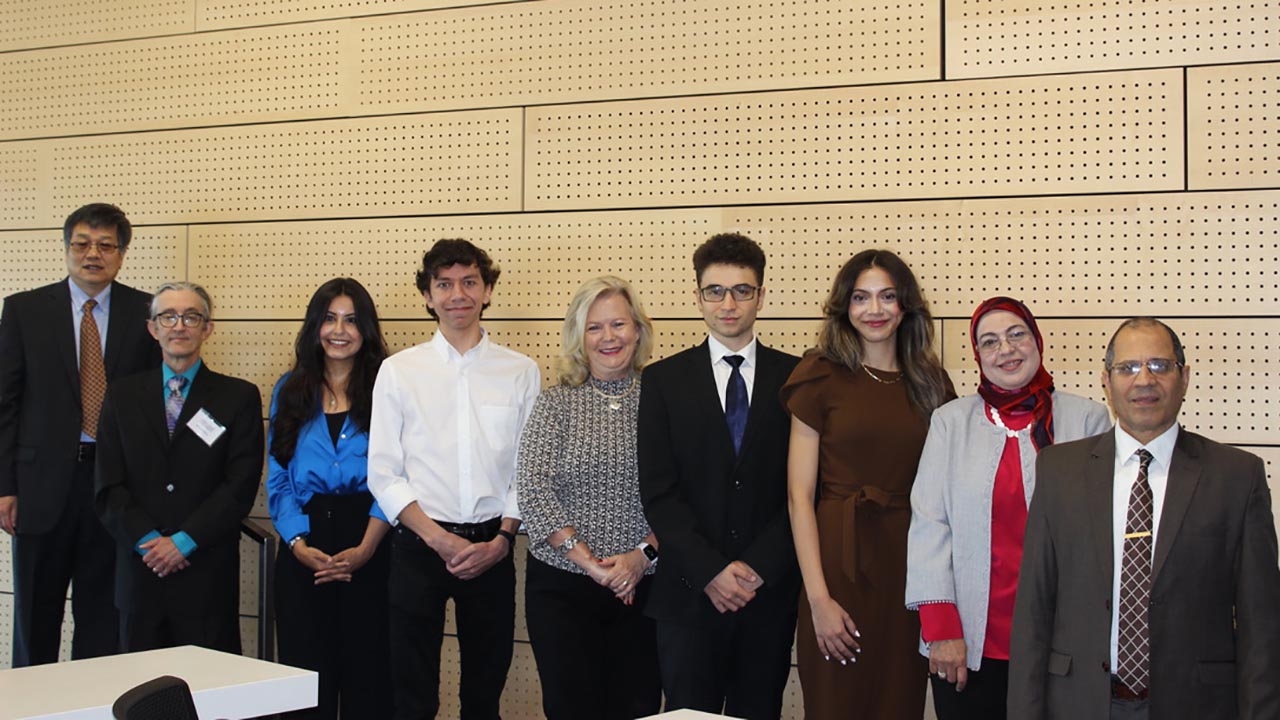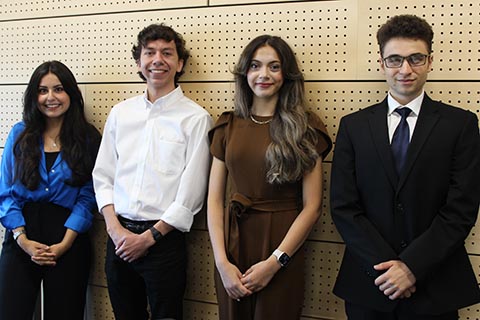OU students share eye disease research at annual SUPER symposium

The Summer Undergraduate Program in Eye Research (SUPER) at Oakland University held its 20th annual student research symposium on Friday, July 29.
The highly selective 12-week program allows students to perform research on the causes and potential cures for eyes diseases — such as glaucoma, diabetic retinopathy, retinitis pigmentosa, age-related macular degeneration, and very rare inherited retinal diseases in infants — with guidance from faculty members in the university’s Eye Research Institute (ERI).
Using the latest scientific methodologies and equipment, students spent 30 hours per week conducting lab experiments and attending a weekly Vision Science seminar given by ERI and Beaumont Ophthalmology faculty. The students also received a research fellowship, as well as training in professional speaking and presentation.
“We usually have five to seven students in the program and applications from OU undergraduate students are accepted through the ERI website each January,” said Dr. Kenneth Mitton, who has served as director of SUPER since 2003. “While some of our labs still had some undergraduate assistants, the pandemic did not allow us to run the program since 2019.
“This has been a very successful restart of the full program, which has seen over 100 OU undergraduates get real-world research training experience and training in scientific communication,” Mitton added. “Students in the program have also had access to weekly ERI Summer Vision and Biomedical Science presentations from ERI faculty and Ophthalmic surgeons from the Ophthalmology Department of the Beaumont Hospital in Royal Oak.”
This year’s SUPER students include:

Gabrielle Abdelmessih, Alexander Seidel, Yasmeen Hassan, and Paul Negoita
• Paul Negoita, a senior who is pursuing a Bachelor of Science (BSc) degree in biology. He was mentored by Dr. Amany Tawfik, an associate professor of biological sciences.
“In our lab, we are doing research on the retina and looking at cell pathology of how elevated homocysteine levels in the blood can cause age-related macular degeneration (AMD),” Negoita. “I am very interested in learning lab techniques and concepts that will allow me to possibly research other diseases in the future.”
• Gabrielle Abdelmessih, a senior who is pursuing a BSc degree in biomedical sciences while minoring in journalism. She was mentored by Dr. Kenneth Mitton, an associate professor of biomedical sciences.
“We are currently sequencing eight genes involved in rare pediatric retinal diseases to understand the contribution of both rare and common genetic factors in their development,” Abdelmessih said. “As someone who is aspiring to become a physician, I thoroughly enjoyed learning about the clinical applications of next generation sequencing.”
• Yasmeen Hassan, a senior who is pursuing a Bachelor of Science in Engineering (BSE) degree in electrical engineering while minoring in biology. She was mentored by Dr. Dao-Qi Zhang, an associate professor of biomedical sciences.
“My research focused on the spontaneous wave activity in the developing retina and how various neurotransmitters can affect this activity throughout development in the mouse model,” Hassan said. “I also studied the direction selectivity feature of retinal waves and my goal was to determine its origin and mechanism.
“Being interested in working in the medical field while also pursuing an electrical engineering major, it was especially interesting to see who the two fields can intersect to deliver comprehensive results that pertain to physiological function,” she added. “I was also able to see the results of my experiments in real time, and in the future I hope to further integrate my background and use software modeling to quantify those results.”
• Alexander Seidel, a senior who is pursuing a Bachelor of Arts (BA) degree in pre-medical studies. He was mentored by Dr. Andrew F.X. Goldberg, a professor of biomedical sciences.
• “I’ve been working on a new technique to measure mouse cone photoreceptor populations,” Seidel said. “When light hits those photoreceptors, vision begins. My goal is to further refine the technique so I can apply it to studying eye disease.”
Acceptance to the SUPER program is limited to OU students and is based on grades, a narrative, career goals, a reference letter and an interview with ERI faculty. Students learn the basics of research including how to keep a research notebook, problem solving, critical thinking, conducting literature searches and preparing a scientific talk. Approximately 75 percent of SUPER graduates go on to medical school or graduate school.
“One ERI SUPER alum, Nahrain Putris, M.D., is currently starting an ophthalmology residency at Beaumont and is the first Oakland University alum to match to this particular location,” Mitton said. “Several other SUPER alums are ER doctors, ophthalmologists, neurosurgeons, medicinal chemistry research scientists, and genetic counselors to name a few occupations.”
To apply for the program, students submit a personal narrative outlining career goals and interests, a letter of reference, academic transcripts and a resume. They are also interviewed by ERI faculty members.
Those admitted to the program receive a research fellowship of $4,250. Students also attend a weekly Vision Science seminar given by ERI and Beaumont Ophthalmology faculty and receive training in professional speaking and presentation.
To learn more about the Eye Research Institute at Oakland University, visit www.oakland.edu/eri.

 August 02, 2022
August 02, 2022







